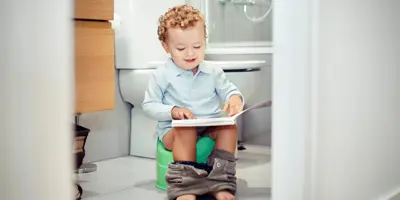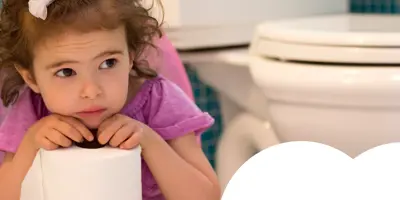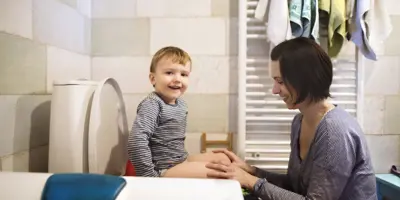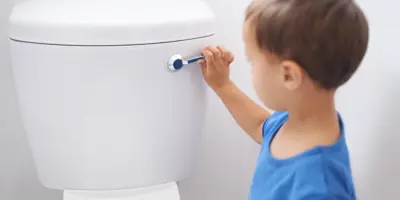21 people found this helpful

Nappy changes, feeds, and flapping around with tissues to try and blow your baby’s stuffy nose: it’s all part of parenthood. And as more baby snot dribbles and endless tissues pile into the bin, it's difficult to remember a time when your only prerogative was getting through the working day. And the laundry. And the hoovering. Luckily for you, we've got seven techniques to help unblock a baby’s nose – so they can breathe easier, and you can finally relax. Put your feet up: you deserve it!
What causes a baby’s blocked nose?
Before we dive into the removal techniques, let’s work out what the cause of all this newborn nasal congestion could be. Sometimes stuffy noses come down to the common cold. In fact, children can have eight colds a year, since they haven’t developed any immunity to the hundreds of types of cold viruses that do the rounds annually.1 And as your kids get older, it’s important to teach them personal hygiene rules – so they can keep happy and healthy all on their own!
The good news is that, as they catch different colds, they build up their immunity bit by bit – so they get fewer colds as they get older. So even though they might not be feeling 100%, you can be safe in the knowledge that they’re getting stronger and their body is learning how to take better care of itself. Phew.
It’s not unusual for colds to last up to two weeks in young children, but most of the time they’ll be better after five to seven days.1 During this time, it’s only natural that you’ll want to do everything you can to care for your little one and help them feel better. And we’re going to share some of the best ways to do this with our advice on how to unblock a baby’s nose.
It might be the ‘snuffles’
‘Snuffles’ are another common reason behind a newborn’s blocked nose.2 They’re not usually caused by an infection or a cold. Rather, they’re caused by mucus that naturally collects in the nose, as your newborn gets used to being out of the fluid in the womb and breathing air through their noses.
The snuffles are common and usually don’t need any attention, unless they’re getting in the way of your baby feeding, in which case you can try the following tips for unblocking a baby’s nose to help free up their nasal passages.
When your baby has a blocked nose with a cold, you want to do whatever you can to help relieve the congestion. We’ve got six techniques to help you unblock baby’s nose, from over-the-counter solutions to baby blocked nose home remedy treatments.
1. Clear a baby’s blocked nose with a tissue
The first step in helping to clear your newborn’s blocked nose is to remove any crusty, hard mucus that has gathered at the outer edge of the nostrils. This sticky snot can block the nostrils, so simply wiping it away with a soft tissue dipped in warm water can really help. Now’s not the time to be squeamish! Snot and mucus aren’t everyone’s favourite things, but it’s time to destigmatise them so we can show care to our little ones.
Having a newborn means cleaning snot, changing diapers, and inevitably forgoing those precious zzz’s. But while you may not have time for much else, it is still possible to carve out time exclusively for you. Luckily, it’s as simple as stocking up on Cushelle’s soft toilet paper with delicately scented core* for a luxuriously soft moment every time you go.
2. Unblock baby’s nose with saline drops
Saline nose drops are a common treatment for a baby’s stuffy nose. They can help relieve a blocked nose by loosening dried snot in the nostrils. Your health visitor, GP or pharmacist will be able to give you more information about how to use them. It’s a good idea to use them sparingly, as frequent use can make the skin surrounding the nose a bit sore.2 You may also want to try using them just before feeds. Some parents use a few drops of breast milk on the nostrils as an alternative to saline drops.
3. Use a nasal aspirator to clear a baby’s blocked nose
Parents often use saline drops in conjunction with an infant nasal suction aspirator. The saline drops help to soften the mucus, and then the aspirator sucks it out. There are various types to choose from, including tubes that you suck, bulbs that you press, and even ones that are powered. Choose whichever one you prefer from your local pharmacy and then follow the instructions on the packet.
4. Treat a baby’s stuffy nose with steam
Steam is a great option if you prefer a baby blocked nose home remedy that takes a more hands-off approach. Turn the hot tap on, close the door, and let the bathroom fill with steam. Sit your baby on your lap and enjoy some bonding time in the steamy bathroom together for a few minutes. If you find the steamy environment helps, you might also want to sit in there to breastfeed.3
5. Help a baby’s blocked nose with humidity
In addition to a brief stint in a steamy bathroom, raising humidity levels for longer periods can be used as a gentle baby blocked nose home remedy.2 This can also help to thin mucus. All you need to do to up the humidity in the room where your baby sleeps is place a bowl of warm water in there. Some parents may even use a humidifier to add moisture to the air.3
6. Keep upright to help unblock baby’s nose
You’ll often find a newborn’s blocked nose is worse when they sleep. That’s because when your baby lies down, the mucus isn’t able to escape from their nostrils. So, use gravity to your advantage to help the snot flow!
Some parents put a towel under the top end of their baby’s mattress to slightly raise the head at night. You might also find your baby naps more easily securely propped up in a car seat or sitting up on your lap during the daytime. When your baby is awake during the day you can give them some extra tummy time, so that gravity can encourage the mucus to drain.3
7. The importance of hydration in easing a newborn’s blocked nose
Our final tip is all about hydration. When you or your newborn is sick, you need to keep their fluid levels up to help prevent the mucous membranes from drying out. Your baby gets rid of any germs in their system through mucus, so by thinning the mucus with fluid you’ll be encouraging it to flow quickly and easily.
Of course, this is easier said than done, as little ones often struggle to feed when their nose is blocked. Try sitting them up and take plenty of breaks so that they can catch their breath between swallowing sessions. With these approaches (and plenty of cuddles), your baby’s blocked nose should get better soon, allowing them to breathe easy again. If it persists longer than a couple of weeks, you’re thinking your baby’s stuffy nose is due to cross-reactivity or general allergies, or you suspect your child has something stuck up their nose, contact your GP for advice.
Remember, at the end of the day, a stuffy nose is common among babies! The most important thing is to help your little one feel comfortable so they can breathe easier – and you can enjoy a quiet cuppa!
*To verify claims, please email verify.uk@essity.com for full verification details.
Sources:
1 ‘Colds, coughs and ear infections in children’, NHS
2 ‘Blocked nose in babies’ (Medically reviewed), Patient.info
3 ‘Nasal Congestion: How To Clear Your Baby's Nose Naturally’, Integris Health
Related articles
Potty Training Tips: How to Potty Train a Boy
Want to know the best age to potty train a boy, or how potty training boys differs from girls? Read on for the essential potty-training tips for boys.

7 handy tips on how to wipe your bum properly
Not sure how to wipe your bum? Worried you’ve been getting it wrong all these years? Find out how to clean your bum properly here.

How to potty train at night: 5 tips for night-time potty training
With these 5 tips on how to potty train at night your little one will soon be dry and you can wave goodbye to middle-of-the-night nappy changes. Click for more.

The potty-to-toilet transition: 7 essential toilet training tips
Do you think your child is ready to make the transition from potty to toilet? Read this guide for toilet training tips from the experts at Cushelle.

What's the Right Age to Start Potty Training?
Is there a 'good' age to potty train? Cushelle answers all your questions about how to know when your child is at potty-training age. Click for more.

How (and When) to Do Potty Training
Potty training can be tricky, but a little patience and some smart parenting tricks can make all the difference. Find out how to potty train kids here!



